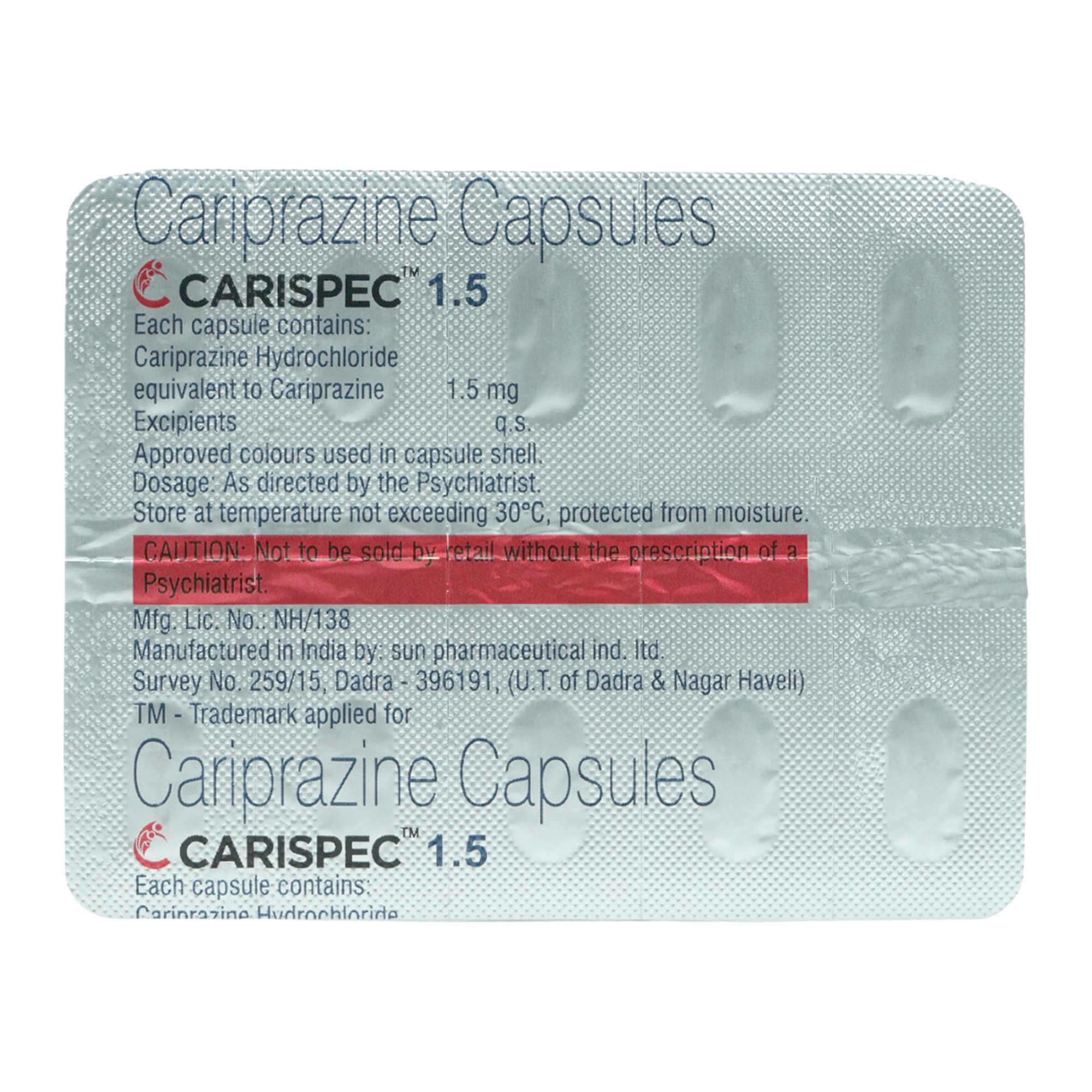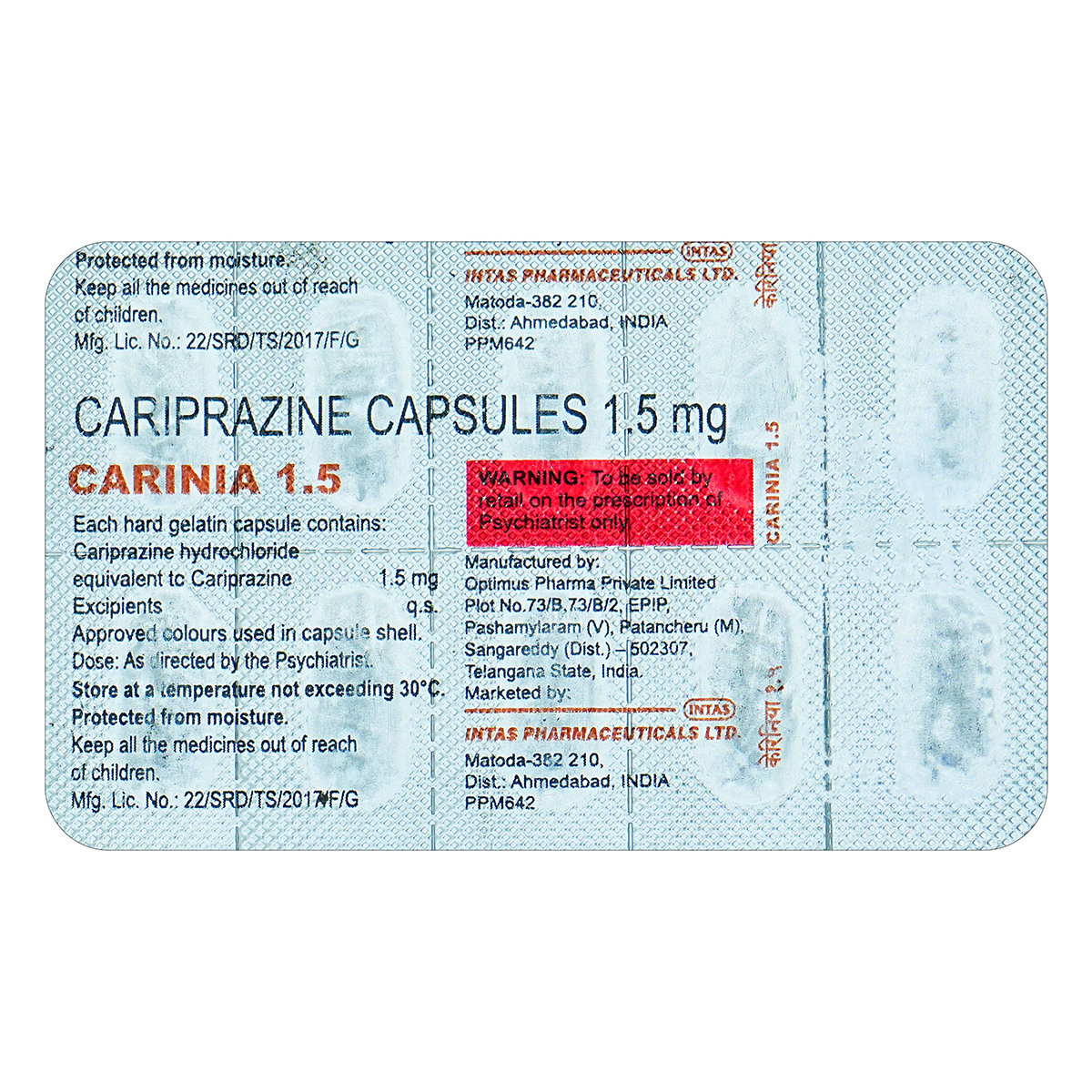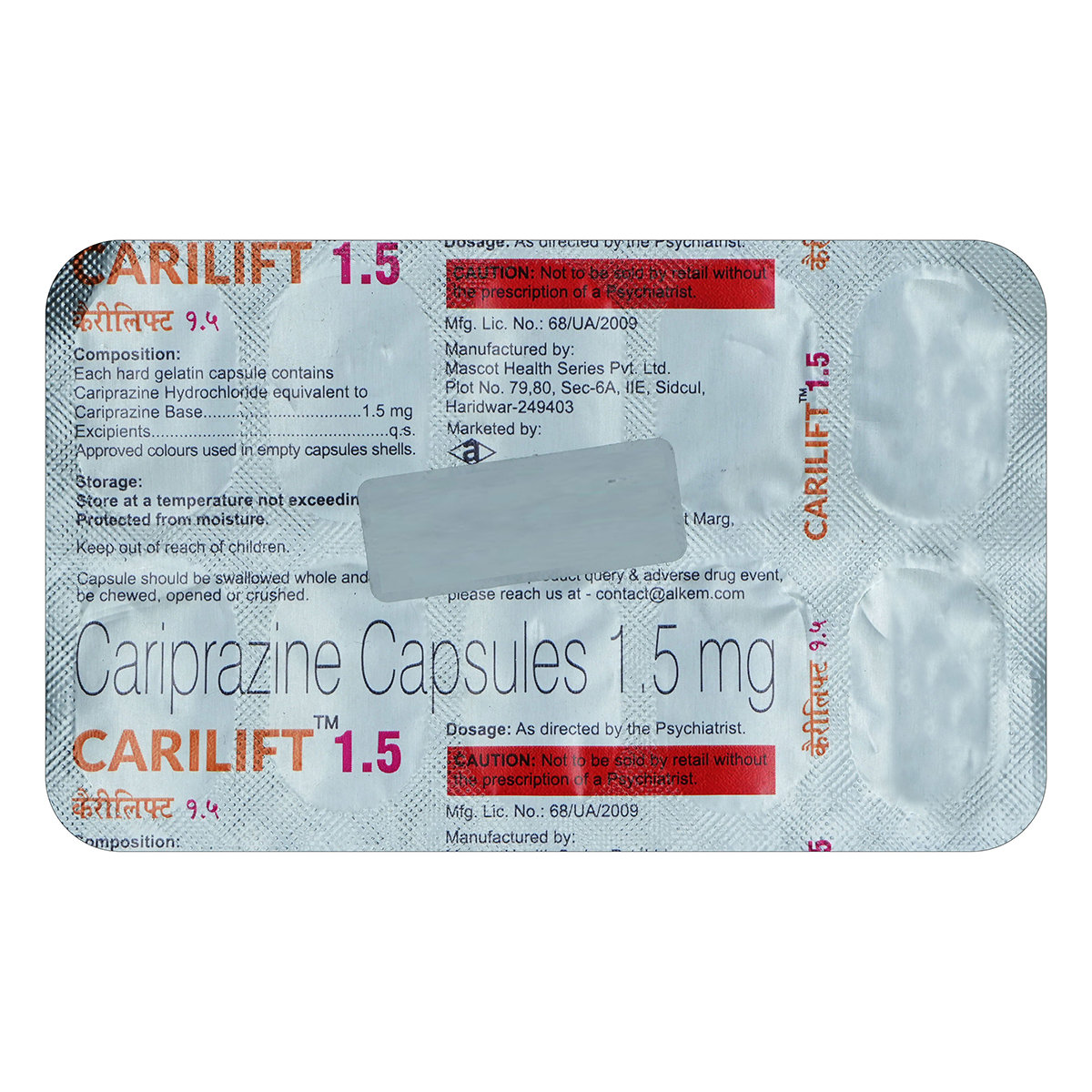CD3D2-1.5 Capsule 10's
MRP ₹108
(Inclusive of all Taxes)
₹16.2 Cashback (15%)
Provide Delivery Location
Online payment accepted
 Prescription drug
Prescription drugWhats That
Composition :
Manufacturer/Marketer :
Consume Type :
Expires on or after :
Return Policy :
About CD3D2-1.5 Capsule 10's
CD3D2-1.5 Capsule 10's belongs to a group of medicines called 'antipsychotics,' primarily used to treat psychotic disorders like schizophrenia. It also treats manic or mixed episodes in adults with bipolar disorder type I.
CD3D2-1.5 Capsule 10's consists of 'Cariprazine,' an atypical antipsychotic. It works by affecting the balance of the neurotransmitters in the brain. Thereby, CD3D2-1.5 Capsule 10's decreases psychotic symptoms like hallucinations and agitated behaviour associated with schizophrenia. It also treats depressive episodes in bipolar disorder type I/bipolar depression in adults.
Your doctor will decide the dose and duration based on your medical condition and response to treatment. Common side effects include restlessness, tiredness, drowsiness, dizziness, tremors/shakiness, blurred vision, difficulty moving or slow movements, involuntary muscle movements, excess saliva/drooling, constipation, upset stomach, nausea, vomiting, increased appetite, weight gain. These side effects are not familiar to everyone and vary individually. If you notice any side effects that are not manageable, please consult your doctor.
CD3D2-1.5 Capsule 10's is not recommended for treatment in patients with dementia-related psychosis. Inform your doctor before starting CD3D2-1.5 Capsule 10's if you have a history of liver/kidney/heart diseases, stroke, high blood pressure, diabetes, high cholesterol levels, swallowing problems, low white blood cell count, or fits. If you are pregnant, planning pregnancy, or breastfeeding, inform your doctor before using CD3D2-1.5 Capsule 10's. Avoid consuming alcohol while being treated with CD3D2-1.5 Capsule 10's as it can make you dizzy or drowsy. Do not drive or operate machinery since this medicine can make you sleepy and interfere with your driving ability. The safety and efficacy of Cariprazine in children and adolescents under 18 years have not been established.
Uses of CD3D2-1.5 Capsule 10's
Directions for Use
Key Benefits
CD3D2-1.5 Capsule 10's is used to treat schizophrenia and associated psychotic symptoms. It contains Cariprazine, which affects the balance of the neurotransmitters in the brain. It helps in clear thinking and relieves psychotic symptoms like hallucinations in schizophrenia. It treats depressive episodes in bipolar disorder type I in adults. It is also an adjunctive therapy to antidepressants in treating major depressive disorder (MDD) in adults.
Storage
- Hydrate your body: Drink enough water to prevent dehydration and headaches.
- Calm Your Mind: Deep breathing and meditation can help you relax and relieve stress.
- Rest and Recharge: Sleep for 7-8 hours to reduce headache triggers.
- Take rest: lie down in a quiet, dark environment.
- Cold or warm compresses can help reduce tension.
- Stay Upright: Maintain good posture to keep symptoms from getting worse.
- To treat headaches naturally, try acupuncture or massage therapy.
- Over-the-counter pain relievers include acetaminophen and ibuprofen.
- Prescription Assistance: Speak with your doctor about more substantial drug alternatives.
- Severe Headaches: Seek emergency medical assistance for sudden, severe headaches.
- Frequent Headaches: If you get reoccurring headaches, consult your doctor.
- Headaches with Symptoms: Seek medical attention if your headaches include fever, disorientation, or weakness.
- Inform your doctor about your constipation symptoms. They may adjust your medication or advise alternative treatments.
- Stay hydrated by drinking sufficient of water (at least 8-10 glasses a day) to help soften stool and promote bowel movements.
- Increase fibre intake by eating foods high in fibre, such as fruits, whole grains, vegetables and legumes, to help bulk up the stool.
- Establish a bowel routine by trying to go to the bathroom at the same time each day to train your bowels.
- Engaging in regular exercise, like walking or yoga, can support in bowel movement stimulation.
- Consult your doctor if constipation persists, and discuss alternative treatments or adjustments to your medication.
Drug Warnings
CD3D2-1.5 Capsule 10's is not recommended for treatment in elderly patients with dementia-related psychosis. Before using CD3D2-1.5 Capsule 10's, let your doctor know if you have a history of liver or kidney diseases, heart problems, stroke, high blood pressure, diabetes, high cholesterol levels, swallowing problems, low white blood cell count, obesity, dehydration, or fits. Please consult your doctor if you are pregnant, planning to conceive or a breastfeeding mother before starting CD3D2-1.5 Capsule 10's. Avoid consuming alcohol during the treatment, as it might increase dizziness and drowsiness. Avoid driving or operating machinery, as this medicine may decrease your mental alertness, making you feel dizzy or drowsy. CD3D2-1.5 Capsule 10's is not recommended for patients below 18 years of age as safety and effectiveness have not been established.
Drug-Drug Interactions
Drug-Drug Interactions
Login/Sign Up
Co-administration of Metoclopramide with CD3D2-1.5 Capsule can increase the risk of side effects.
How to manage the interaction:
Taking CD3D2-1.5 Capsule with Metoclopramide is generally avoided, but can be taken together if prescribed by a doctor. However, if you experience muscle spasms or movements that you can't stop or control, such as lip smacking, chewing, puckering, frowning or scowling, tongue thrusting, teeth clenching, jaw twitching, blinking, eye-rolling, shaking or jerking of arms and legs, shaking of hands and legs, jitteriness, restlessness, pacing, and foot tapping, contact a doctor immediately. Do not stop using any medications without talking to a doctor.
Taking CD3D2-1.5 Capsule and Ceritinib can significantly increase the blood levels of CD3D2-1.5 Capsule.
How to manage the interaction:
Although taking CD3D2-1.5 Capsule and Ceritinib together can evidently cause an interaction, it can be taken if your doctor has suggested it. However, if you experience dizziness, lightheadedness, headache, flushing, fainting and fast heartbeat contact your doctor immediately. Do not stop using any medications without a doctor's advice.
Taking CD3D2-1.5 Capsule with Dezocine may increase the risk of brain related problems.
How to manage the interaction:
Although there is a interaction between CD3D2-1.5 Capsule and Dezocine, but it can be taken if prescribed by a doctor. However, consult a doctor if you experience trouble breathing, feeling too sleepy or dizzy, having trouble focusing. Do not stop using any medications without a doctor's advice.
Taking bupropion with CD3D2-1.5 Capsule may increase the risk of seizures(fits).
How to manage the interaction:
Taking CD3D2-1.5 Capsule with Bupropion is generally avoided, but can be taken together if prescribed by a doctor. However, if you experience muscle spasms or movements that you can't stop or control, such as lip smacking, chewing, puckering, frowning or scowling, tongue thrusting, teeth clenching, jaw twitching, blinking, eye-rolling, shaking or jerking of arms and legs, shaking of hands and legs, jitteriness, restlessness, pacing, and foot tapping, contact a doctor immediately. Do not stop using any medications without talking to a doctor.
Taking CD3D2-1.5 Capsule with Voriconazole may significantly increase the blood levels of CD3D2-1.5 Capsule.
How to manage the interaction:
Although taking CD3D2-1.5 Capsule and Voriconazole together can result in an interaction, they can be taken together if prescribed by a doctor. However, if you experience dizziness, nausea, or loose stools, consult a doctor. Do not stop using any medications without consulting a doctor.
Taking CD3D2-1.5 Capsule with Iohexol may increase the risk of causing fits.
How to manage the interaction:
Co-administration of CD3D2-1.5 Capsule with Iohexol can possibly result in an interaction, but it can be taken if your doctor has advised it. However, if you experience any unusual symptoms such as lip smacking, chewing, puckering, frowning or scowling, tongue thrusting, teeth clenching, jaw twitching, blinking, eye-rolling, shaking or jerking of arms and legs, shaking of hands and legs, jitteriness, restlessness, pacing, and foot tapping, contact a doctor immediately. Do not stop using any medications without talking to a doctor.
Using Morphine together with CD3D2-1.5 Capsule can cause central nervous system depression (a physiological state that can result in a decreased rate of breathing, decreased heart rate, and loss of consciousness).
How to manage the interaction:
Co-administration of Morphine with CD3D2-1.5 Capsule can result in an interaction, but it can be taken if a doctor has advised it. However, if you experience dizziness, drowsiness, difficulty concentrating, and impairment in judgment contact a doctor right away. Do not stop using any medications without consulting a doctor.
Taking CD3D2-1.5 Capsule with Sodium oxybate can increase the risk of serious side effects.
How to manage the interaction:
Co-administration of CD3D2-1.5 Capsule with Sodium oxybate can possibly result in an interaction, but can be taken together if prescribed by a doctor. However, if you experience dizziness, drowsiness, difficulty concentrating, and impairment in judgment contact your doctor immediately. Do not stop using any medications without first talking to your doctor.
Coadministration of Itraconazole and CD3D2-1.5 Capsule together may significantly raise the blood levels of CD3D2-1.5 Capsule.
How to manage the interaction:
Taking CD3D2-1.5 Capsule with Itraconazole is generally avoided, but can be taken together if prescribed by a doctor. However, if you experience muscle spasms or movements that you can't stop or control, such as lip smacking, chewing, puckering, frowning or scowling, tongue thrusting, teeth clenching, jaw twitching, blinking, eye-rolling, shaking or jerking of arms and legs, shaking of hands and legs, jitteriness, restlessness, pacing, and foot tapping, contact a doctor immediately. Do not stop using any medications without talking to a doctor.
Topiramate can cause increased body temperature and decreased sweating, and these effects may be worsened when combined with CD3D2-1.5 Capsule.
How to manage the interaction:
Although taking CD3D2-1.5 Capsule and Topiramate together can evidently cause an interaction, it can be taken if your doctor has suggested it. If you're having symptoms like not sweating enough, having a high body temperature, or feeling tired, dizzy, or lightheaded, it's important to contact a doctor. Do not stop using any medications without a doctor's advice.
Drug-Food Interactions
Drug-Food Interactions
Login/Sign Up
Diet & Lifestyle Advise
- Maintain proper weight by following a healthy diet.
- Exercise regularly as it helps in less cognitive decline and brain volume loss.
- Avoid smoking and alcohol consumption.
- Try to avoid stress by practising meditation or yoga.
- Include fruits and vegetables in your diet as they contain antioxidants.
- Eat nutritious food as it helps in cognitive stimulation.
- Limit foods with high cholesterol and saturated fats.
- Cut down on sugar, salt and processed foods.
- Drink plenty of water.
- Follow a healthy lifestyle as it helps improve overall health and possibly protects the brain.
Side Effects of CD3D2-1.5 Capsule 10's
- Restlessness
- Tiredness
- Drowsiness
- Dizziness
- Tremors/shakiness
- Blurred vision
- Difficulty moving or slow movements
- Involuntary muscle movements
- Excess saliva/drooling
- Nausea
- Vomiting
- Constipation
- Upset stomach
- Increased appetite
- Weight gain
Habit Forming
Therapeutic Class
All Substitutes & Brand Comparisons
RX
Carispec 1.5 Capsule 10's
Sun Pharmaceutical Industries Ltd
₹100
(₹9.0 per unit)
7% CHEAPERRX
Caripzin-1.5 Capsule 10's
Tripada Lifecare Pvt Ltd
₹90
(₹9.0 per unit)
7% CHEAPERRX
Caripriza 1.5 Capsule 10's
Mesmer Pharmaceuticals
₹101
(₹9.09 per unit)
6% CHEAPER
Author Details
We provide you with authentic, trustworthy and relevant information
Drug-Diseases Interactions
Drug-Diseases Interactions
Login/Sign Up
FAQs
Drug-Drug Interactions Checker List
- KETOCONAZOLE
- FLUCONAZOLE
- PHENYTOIN
- PHENOBARBITAL
- METOCLOPRAMIDE
Special Advise
- CD3D2-1.5 Capsule 10's is not approved for the treatment of patients with dementia-related psychosis
- Let your doctor know that you are taking CD3D2-1.5 Capsule 10's if you are undergoing any medical tests.
- Weight gain has been noticed in patients who use Cariprazine; hence, regular weight monitoring is recommended.
- Orthostatic hypotension is also recorded in patients using this medicine. Hence caution is recommended in patients with cardiovascular and cerebrovascular diseases.
- CD3D2-1.5 Capsule 10's may affect blood glucose levels; hence it is advised to monitor blood sugar levels regularly while using CD3D2-1.5 Capsule 10's.
- Timely monitoring of the cholesterol/triglyceride levels is advised for the patient while using this medicine.
Disease/Condition Glossary
Schizophrenia: It is a condition in which the person may see, hear or feel things that are not there, believe things that are not true, or feel unusually suspicious or confused. Symptoms include hallucinations, delusions, thought disorders, movement disorders, disorganised thinking, loss of interest, lack of emotions, etc. Schizophrenia is triggered by physical, genetic, psychological, and environmental factors. Patients suffering from this disease may require lifelong treatment. Treatment involves a combination of medications, psychotherapy and care services.
Bipolar I disorder: It is a serious brain disorder in which a person goes through unusual mood changes (mood swings) and frequent changes in his/her behaviour and thinking. The symptoms may last at least seven days (most of the day, nearly every day), or the manic symptoms are so severe that the person needs immediate hospital care. Treatment involves mood stabilizers, antipsychotics, and sometimes sedative-hypnotics.

Have a query?
Alcohol
Safe if prescribed
Avoid alcohol consumption while using CD3D2-1.5 Capsule 10's. Alcohol intake while being treated with CD3D2-1.5 Capsule 10's, may cause increased dizziness and drowsiness. Please consult your doctor for more information.
Pregnancy
Consult your doctor
Using antipsychotic drugs during the third trimester of pregnancy may cause extrapyramidal (drug-induced movement disorders) and/or withdrawal symptoms in newborn babies. Please consult your doctor before taking CD3D2-1.5 Capsule 10's if you are pregnant or planning to conceive. Your doctor will weigh the potential risks and benefits before prescribing CD3D2-1.5 Capsule 10's.
Breast Feeding
Consult your doctor
It is not known if Cariprazine is excreted into breast milk. Please consult your doctor before taking CD3D2-1.5 Capsule 10's if you are a breastfeeding mother.
Driving
Safe if prescribed
CD3D2-1.5 Capsule 10's may make you feel dizzy or drowsy. Do not drive if you are not mentally alert or experience any symptoms that affect your ability to drive or operate machinery.
Liver
Consult your doctor
Let your doctor know if you have any history of liver diseases or hepatic impairment when you are prescribed with CD3D2-1.5 Capsule 10's.
Kidney
Consult your doctor
Let your doctor know if you have any history of kidney diseases when you are prescribed with CD3D2-1.5 Capsule 10's.
Children
Safe if prescribed
CD3D2-1.5 Capsule 10's is not recommended for use in children and adolescents below 18 years of age as safety and effectiveness have not been established.











